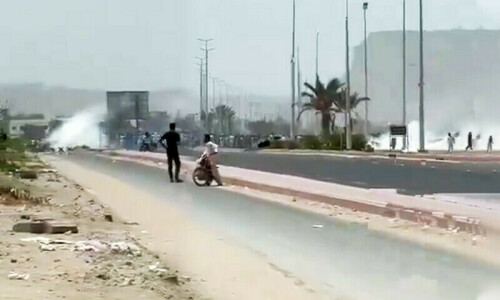EVENTS in Balochistan have been extremely disturbing of late. The past few days alone have brought tensions in the troubled region to a head. The brute force used by the authorities to stop a peaceful protest rally has inflamed an already volatile situation. The province stands dangerously polarised. Yet, those in power seem to have no realisation of the gravity of the situation.
Thousands of people from across the province have gathered in Gwadar, protesting not only against enforced disappearances but also for their democratic rights. A number of people, including security personnel, have reportedly been killed or injured in the clashes. Scores of marchers have been detained and roadblocks placed in many parts.
All the administration’s efforts, however, have failed to stop the rally which has been organised by the Baloch Yakjehti Committee and is supported by some Baloch nationalist parties. It was not the first such protest against enforced disappearances in the province and outside, but it has certainly been the most consequential in recent years. Led by Mahrang Baloch, the young firebrand medical doctor, the BYC has emerged as the most powerful voice against state oppression.
Angry protesters have brought life to a halt in all major towns in southern Balochistan, which has become the centre of discontent. The use of violence by the administration and roadblocks to stop the march have further infuriated the public. Anti-establishment protests have spread to a large part of the province. They reflect the growing alienation of the Baloch population, which has long been deprived of its fundamental rights.
A large number of the demonstrators are women, whose family members have either been missing for years or have been killed, their cruelly tortured bodies found dumped. It is alleged that they had been picked up by security personnel.
Angry protesters have brought life to a halt in all major towns in southern Balochistan.
Mahrang Baloch herself has experienced this. Her father was abducted in 2009 and his tortured remains were recovered in 2011. These events propelled her to become an activist for the Baloch.
The persecution of male political activists has forced their women relatives to take to the streets and lead the movement. The number of enforced disappearances and incidents of judicial killings have increased, with the state facing growing separatist militancy. The main objective of the peaceful protest is to draw attention to the plight of the hapless population.
Unfortunately, their cries for justice have fallen on deaf ears; the authorities, instead of assuaging their woes, are stifling the protesters’ voices. We hear the same old mantra of anti-state elements being behind the protests. There is no realisation of the widening divide between the Baloch people and the state. The people have no trust in the manipulated political system imposed on the province through rigged elections. The authority of the state is now being increasingly challenged by people’s power in retaliation to the suppression of the democratic process.
Balochistan has witnessed a low-intensity conflict for several years now, with the latest phase beginning some two decades back after relative peace from 1980 to 1988 — the latter was the year that civilian rule was restored after the Zia era, and Baloch nationalists began to be reintegrated into the political mainstream. But that uneasy calm ended when, during Gen Musharraf’s rule, the tribal chief Nawab Akbar Bugti was killed in an army operation in 2006. Simmering discontent once again spilled over as fresh hostilities began. Instead of finding a political solution to end the growing public discontent, the state adopted the kinetic option.
Baloch grievances are very real and of long standing. Yet force has been used to crush the people’s voice. Despite its natural wealth, the province is the most underdeveloped region in Pakistan, and is ranked low on social indicators. Even the much-touted development under CPEC has done little to rescue Balochistan from poverty.
Balochistan’s Gwadar seaport, which is supposed to be the flagship project of the multibillion-dollar CPEC, has unsurprisingly become the main centre of public unrest. While the local population is living in absolute poverty, with few education and healthcare facilities available to them, prime real estate on the coast is being allotted to outsiders. The town has been the venue of many protests in recent years. But the BYC was not given permission to arrange a rally in the town for ‘security reasons’.
It is in such circumstances that many Baloch youth, who had lost hope in the flawed democratic political process, have been inclined to join militant groups. Extrajudicial killings and the illegal detention of political activists have pushed many educated and disgruntled youth to the wall. A large number of Baloch students have been picked up allegedly by security agencies from university campuses in the country. The fear is that they will never come home.
Such draconian measures and denial of democratic rights have been the major reason behind the rise of separatist militancy in the province. Surely, there is some truth to the allegation of external support for Baloch militant groups, but the real cause of the militancy is rooted in state repression and the denial of democratic rights. The state crackdown is providing ready recruits to militant groups. The authorities cannot control the growing public discontent by resorting to brute force. As the events of the past week have shown, repressive action cannot work to crush the people’s struggle.
One has to listen to what Mahrang Baloch and other Baloch leaders are saying. They just want the state to stop enforced disappearances and give the Baloch people their democratic political rights. They also want the Baloch people to get their due share of development and local economic resources. If these saner voices are suppressed, there will be no hope for the future.
The writer is an author and journalist.
X: @hidhussain
Published in Dawn, July 31st, 2024














































Dear visitor, the comments section is undergoing an overhaul and will return soon.